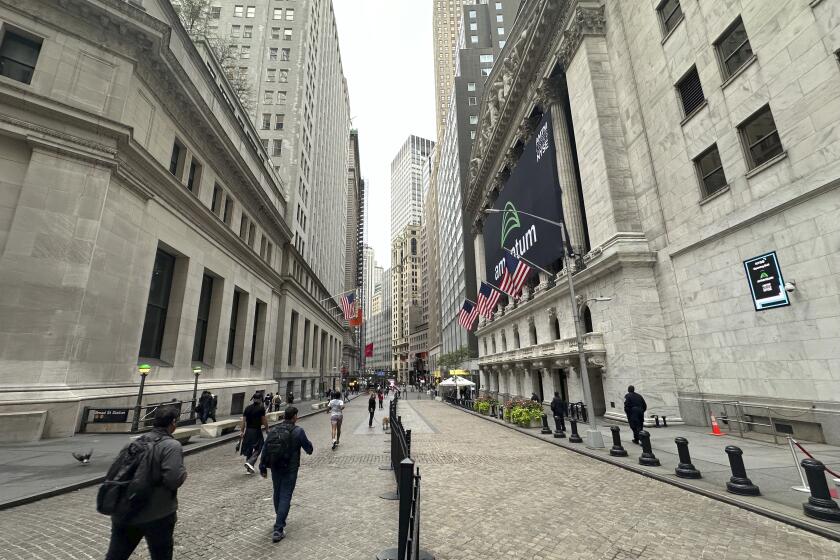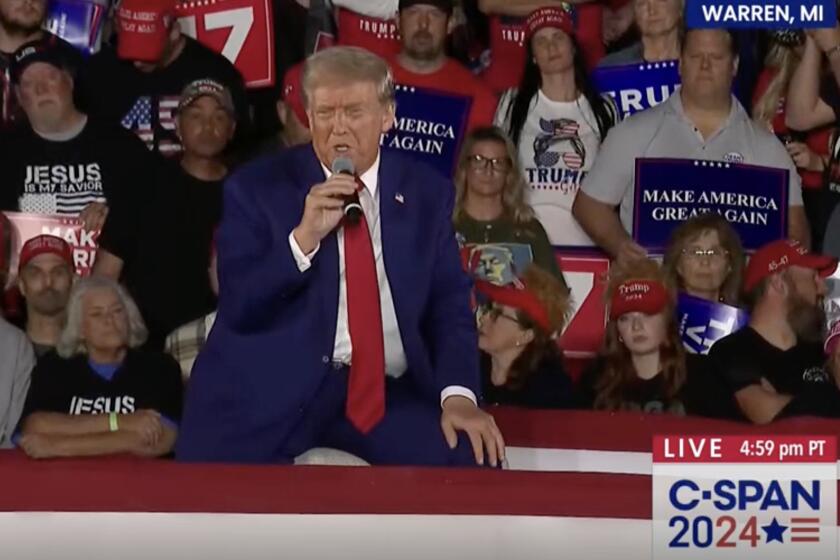O.C. Gun Maker Bryco Caught in Firing Range
It’s been gun on the run lately.
Colt, one of the big-league gun makers from a century ago, has announced a major scaleback on handgun production. One Riverside County gun manufacturing plant recently closed its doors, and a second there is facing Chapter 11 bankruptcy. A Valencia manufacturer has filed for Chapter 7.
Now it appears that Bryco Arms, which does its best to operate unobtrusively in Costa Mesa, is up to its barrel in troubles.
Bryco business is significantly down, according to watchdogs who monitor the federal Bureau of Alcohol, Tobacco and Firearms (BATF) gun production reports. Also, Bryco is listed along with other firearms makers in more than a dozen lawsuits filed by cities seeking to recoup the costs of gun violence. The company’s founder and former owner may face licensing trouble with the feds. And recent negative publicity hasn’t helped--a Bryco .380-caliber semiautomatic handgun was used by an Illinois white supremacist on a deadly shooting spree earlier this year.
Deadline on Cheap Guns
And if all that isn’t enough for Bryco’s owners, new California law gives the makers of cheap handguns 15 months to improve the quality of their products to meet upgraded safety tests. The tests are designed to eliminate guns known as Saturday night specials, often used by crooks on the street who can’t afford to trade in higher-priced weaponry. Does Bryco see the new handgun law as significant? Gun control advocates certainly see Bryco as seriously affected.
What is Bryco’s view of all these troublesome points?
That’s hard to say.
You call Bryco itself, where the name on the company door says not a word about guns, and you get no answers whatsoever. They won’t even say who’s the manager. You ask for the phone number for Bryco’s attorney, and they won’t give it to you.
But I did hear back from him. Oh boy, did I hear from him. James Sabalos, who represents Bryco, was threatening to sue me before I’d hardly asked any questions. Before he hung up on me, he blasted me with a stream of profanities and vulgar references to my character that I couldn’t print here, even if they were true.
Between the four-letter words, however, Sabalos did say that the municipal lawsuits were costly to the company. He listed Bryco as defendant in about 17 or 18 of them. But he also said Bryco was pursuing them vigorously, with no intention of a settlement.
Attorney Cites Ohio Ruling
Sabalos put great stock in a decision last week by an Ohio judge throwing out a similar lawsuit brought by the city of Cincinnati. Sabalos said he believes all the lawsuits will be thrown out. The Ohio case, however, hasn’t deterred the other lawsuit cities, like Los Angeles and San Francisco, from pushing on.
Sabalos refused to discuss Bryco’s finances, even just a simple thumbs up or thumbs down. And he also wouldn’t say just who owns the company now. He did tell another newspaper he doesn’t see Bryco heading for bankruptcy.
Which is what has happened to Lorcin, Davis and Sundance, three other Southland handgun manufacturers. (Davis in Chino is in Chapter 11, and plans to continue production.)
Garen Wintemute, director of the UC Davis Violence Prevention Research Program, predicts a bleak future for Bryco. He points to production figures he obtained from the BATF under the Freedom of Information Act, which shows a staggering drop in Bryco’s production.
In 1993, for example, BATF reports Bryco produced 251,633 handguns. But in 1995, that had dropped to 56,727. And by 1997 (latest figures available by BATF) it had dropped further to 47,688.
No one at the company would discuss those figures with me, or whether the two years since then have shown a production increase.
Wintemute sees the drop as understandable: Crime went down during that period, and gun sales usually fall when that happens. Gun control’s increased popularity has hurt too.
You could understand if Bryco doesn’t care much for Wintemute. He’s written numerous gun control papers. He also created the term, now commonly used among gun foes, “Ring of Fire,” to describe the string of Southern California gun manufacturers who specialize in making cheap handguns. He lists Bryco among them.
Much of the Ring of Fire stems from one family.
George Jennings began making Saturday night specials in 1970. His son, Bruce Jennings, eventually founded the company that became Bryco. Bruce Jennings’ brother-in-law and a nephew also started their own gun companies in the Southland, all specializing in Saturday night specials. Bruce Jennings even named his private plane Saturday Night Special.
Bruce Jennings, according to Wintemute’s research and other published reports, turned over Bryco to his ex-wife, Janice, in a divorce settlement in the 1980s. Sabalos is quoted in the Washington Post acknowledging that she now runs the company. Bruce Jennings, however, maintained a Nevada distributorship, B.L. Jennings Inc., which resells all the guns made by Bryco Arms.
Sabalos told another newspaper he represents both Bryco and B.L. Jennings. It’s the latter that’s facing legal troubles now.
According to the Washington Post, the BATF is seeking to revoke Bruce Jennings’ distributorship license because he was convicted of misdemeanor domestic violence charges in 1985. A new law denies such licenses to those convicted of domestic violence.
A hearing on Jennings’ license is pending, according to the paper.
The Post has raised questions about whether Jennings’ close involvement with Bryco could affect that company’s license too.
Sabalos hung up on me before I could get to that question.
Wintemute doesn’t see Bryco turning things around: “I think these manufacturers have decided it’s no longer possible to make easy money selling cheap handguns. They may just all decide to go into another business.”
Jerry Hicks’ column appears Monday and Thursday. Readers may reach Hicks by calling (714) 564-1049 or sending e-mail to jerry.hicks@latimes.com
More to Read
Inside the business of entertainment
The Wide Shot brings you news, analysis and insights on everything from streaming wars to production — and what it all means for the future.
You may occasionally receive promotional content from the Los Angeles Times.








